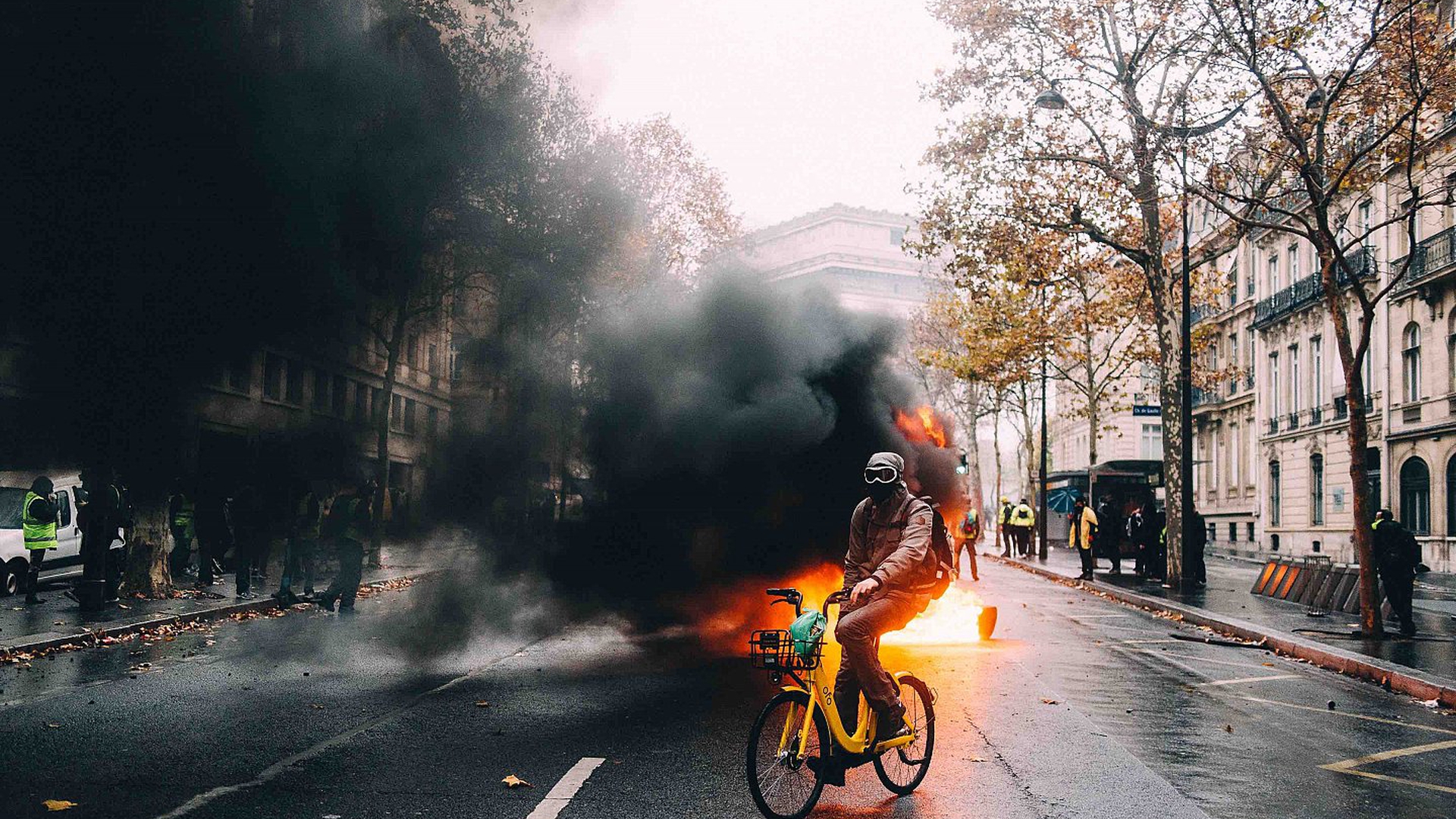5-6-7-8 : After the Roundabout, let’s build the long bridge!

inquiry
5-6-7-8 : After the Roundabout, let’s build the long bridge!
by
Plateforme d'Enquêtes Militantes
/
Dec. 4, 2019
Before the French general strike
The strike day on 5 December is already shaping up to be a success from the point of view of the forces being mobilised. An impressive number of trade union bases are in order of battle, all sectors combined, private and public. But recent experience of such mobilizations - against Labour Bill I and II in 2016 and 2017, and against public rail breakage and university selection in 2018 - encourages us to move beyond traditional forms of social movement. And above all, the Yellow Vests have been through this and it now seems impossible to return to the classic format of alternating well-managed demonstrations and shitty negotiations.
But what could a gilet-jaunized strike look like? First, it would probably be a strike that would go beyond the traditional agenda and would open up to a wide range of issues. It would continue on December 6, renewable, to inform the power plants that we did not come to march. Then on Saturday, December 7 with the Yellow Vests to remind Macron that “we are here” and always motivated to pick him up at his home. On Sunday, December 8, the Mantois mothers’ collective invites to extend the collective impulse in the name of the self-defence of the working class ans suburn neighbourhoods, still at the forefront of repression. Who to host Monday the 9th? Tuesday the 10th? And then what? And how?
*Note on title: The french Word ‘le pont’ is used to describe a week end prolonged by a public holiday, le ‘grand pont’ is when the public holiday is on Tuesday or Thursday: in France, the strike has been called on Thursday.
Pensions: a matter of Life or Death
The announced pension “reform” is a pure and simple demolition of an already damaged system. Since 1993, the regressions have been ongoing, with an increase in the number of trimesters required to retire and a continuous decrease in pensions. In the end, it is the daily life of the elderly that has been stroke badly and that is why so many of them have put on the Gilet Jaune.
To pass the neoliberal pill, any argument is good. First, the government claims that this is a “more egalitarian” reform because it eliminates the good pension plans that some professions have obtained through fighting. Except that special pension plans are only 3% of pensions, so that’s not where the real issue lies, neither for Macron nor for us. The real issues are questions of life and death, in good or bad health, with or without money. Today, a private pensioner receives on average 75% of his or her salary. According to the very comprehensive evaluations of the collective “Nos retraites”, the Macron reform could lead to a 15 to 25% reduction of this rate, i.e. several hundred euros less. For the rich all is OK, they will be able to pay themselves pensions by capitalization, in the private sector. The reform will even benefit the wealthiest of them, those earning more than 120,000 euros per year, since their contribution rates - oh scandalous - are expected to fall compared to the current levels.
A big argument repeated over and over again on TV shows, is as simple as pie: “As you live longer, you have to contribute longer”. Except that we all age differently and that inequalities are enormous: the healthy life expectancy of an executive is 10 years longer than that of a worker. In other words: the proletarians indirectly finance the retirement of many executives, who have fun on golf courses while the others are in the cemetery. And finally, if we look at the effect of all the reforms, we have not won that much since the years worked in addition are increasing as fast as life expectancy! For those born after 1955, it’s barely a year of retirement won in the end, so not much considering what they put us through at work. And on top of that, the “point-based pension system” implies that the level of the point (i.e. the level of the pension) is permanently renegotiable. So we will no longer even know what to expect and the slightest “economic crisis”, real or invented, could serve as a pretext for impoverishing future pensioners.
To this reform must be associated another one: that of unemployment insurance, which the government introduced this year in October. The principle is the same as for pensions: you will have to work harder to earn less. And the reforms will even be cumulative: the unemployed will be expelled from the unemployement insurance system faster so they will contribute less, a double penalty. What emerges from all this is not only a deterioration of our living conditions, but also a major aggravation of the disciplinary system that pushes us to work all the time and accept rotten jobs to eat. Rotten jobs that in the end make you die faster… hellish circle.
Ultimately, pension and unemployment reforms are part of the government’s strategy of “capitalizing” welfare and social reproduction institutions. This is the only imperative mandate that Macron loyally respects: that of the neoliberal project on a European scale. This is why no negotiation on particular contents of the reform can be accepted, given the scale of the attack and especially in the light of an unprecedented year of struggle, hard, exciting and joyful, on the part of the Yellow Vests. As we have seen since 17 November 2018, all responses to the uprising have been given by the government in line with its political project, without changing course. Without questioning the foundations of his increasingly individualistic, authoritarian and destructive world view in terms of human relations, but also in terms of relations between society, nature and other living beings. And by amplifying, Act after Act, a fierce repression that will long mark the collective consciousness. Fraternity, solidarity, the construction of community life, the struggle for a better world: these are the real enemies of government. These are our most precious resources, our strengths in building a historic strike.
L’effet Jaune (Yellow Vest effect): offensiveness, creativity and reproduction
Since last spring, there have already been many signals of a yellow effect in social, feminist and ecological, student and high school mobilizations. We only have to look back over a very recent period to see it on the trade union side. In Châtillon (a suburb town near Paris), the railway workers have built a victorious struggle against the reorganisation of their services, without giving notice, at local level, on the basis of general assemblies and remaining out of the control of the trade union confederations. In mid-October, the fire-fighters went well beyond the traditional demonstration by completely overflowing the police apparatus that was trying to control their anger. More recently, workers have carried out actions to block refineries in order to contest the tax increases they will be facing. In the hospital sector, mobilization has also taken on a very particular scale and the momentum has succeeded in transcending the usual boundaries between services that too often limit the struggles of health workers.
On the university side, the immolation of a student from Lyon caused an important awakening and led to the orientation of the watchwords on the theme of student precariousness. In various general assemblies, the speeches highlighted the harshness of the living conditions and the obvious connection with the Yellow Vests watchwords heard over the past year. The actions that have been carried out, such as the free operations in university restaurants, are also a strong reminder of what the Yellow Vests have been able to do with free tolls. In this form, student mobilizations attack the field of reproduction, raise the question of income and give themselves the possibility of opening up to a social movement that is not closed on the campus but open and global. The successful movement of the CPE (First Employement Contract in 2006), its proliferation of initiatives and massive demonstrations is not that far away and one can certainly draw ideas from it.
In high schools, an offensive dynamic is also underway, as shown by the level of repression faced by students in Massy or Bordeaux, whose attempts to block their schools were drowned under tear gas, LBDs (a non-lethal fire weapon) and disembarkation grenades on 25 and 26 of November. From the first weeks of the yellow uprising, in December 2018, high school students in working-class neighbourhoods had already shown their willingness to actively participate by taking offensive actions in front of their high schools. The repression that followed marked a turning point, with images of teenagers kneeling on the ground, hands on their heads, producing the effect of an electroshock for both young people and their parents. It is precisely to remind us of the need for self-defence of the working class and suburbs districts, against oppression and state racism, that a major march is being called this Sunday, December 8.
Ecology, Feminism: Waves In Progress
Since the beginning of the 2019 academic year, environmentalist struggles have also sought to break out of a too narrow framework that would limit this fundamental issue to the bogus negotiations of COP21 and other anti-democracy summits, or to the question of our taps being opened or closed while brushing their teeth. The mobilization on September 21 and the alliances that took place with the Yellow Vests - both in terms of content and form - and the actions to block the metropolis, shopping malls and their logistics branches, clearly show that a radical dynamic is underway. These dynamics make it possible to include the battle of pensions in the ecological struggle - and vice versa - which would not have seemed possible some time ago. The link can now be clearly seen: a reform that proposes to work more and produce more to finance our old age is a hardening of the productivist model and these deadly logics. The ecologist movement must therefore consider such mobilization as an important issue in the creation of forces capable of stopping the steamroller of neoliberalism and therefore the destruction of life. It is in this type of articulation that the development of counter-power, such a crucial issue for ecology, will certainly be played out.
More recently, the November 23rd feminist wave against gender-based violence has revived the fundamental movement that is currently going through many countries around the world. The huge demonstration and the creative slogans that emerged clearly call for an extension. The strike of 5 December has been mentioned a lot in the demonstration, with the feminist strike of 8 March as a target, which promises to be an important step. By reappropriating the tool of the strike, as it has already done elsewhere, the feminist movement intends to broaden the scope of its action and carry the anti-patriarchal struggle in all spaces. Pension reform is from this point of view a major challenge, since women already suffer more strongly from inequalities in the system. Retired women’s pensions are now 38% lower than those of men, as a result of wage inequalities, career breaks and mandatory part-time work. 37% of retired women receive less than €1,000 in gross pensions, compared to 15% for men. In the current system, inequalities to precariousness are slightly smoothed out by taking into account the best 25 years, so it will be even worse if the whole career is taken into account.
Whether in its watchwords or in its practices of struggle, the pension movement must be thought of in the articulation of all these dimensions, which together form a global programme of attack on Macron and his world. From a strategic point of view, pensions are a fundamental but nevertheless too limited issue to trigger a proliferation at the height of the current situation. In the continuity of the yellow effect, let us broaden our objectives beyond the negotiable.
A horizon at the height of our intuitions
The imagination of social conflict is increasingly indebted to the upheaval of the Yellow Vests, both in terms of demands and practices of struggle and forms of organization. With regard to the first point, we have now learned over the past year the basic logic of the uprising, which is now being taken up and implemented all over the world: no questioning of the distribution of wealth without disrupting the dominant political institutions; no fiscal and ecological justice without putting the property order in crisis. In short, no social revolution without a democratic revolution. What here in France has a very simple meaning: to make things happen, it is first of all Macron, his government and the world he represents that must be brought down. And to bring it down, it is necessary - in a synchronized way - to destabilize its command over the territories, to block the economy throughout its cycle (production, circulation, consumption and reproduction) and to invent other forms of living and organizing itself in common, by practicing local autonomy and direct democracy on a daily basis.
These intuitions are now assumed by a social composition that extends well beyond the composition that began on November 17, 2018. Whoever thinks that the Yellow Vests were in the end just a temporary interruption of the traditional principles of social dialogue and the rules of the militant game, should take a closer look at the demands and practices of struggle that are spreading at a mad pace throughout society.
A gilet-jaunized strike is not simply a strike, it is is also a strike that extends into the economic and logistics space to affect all social relations and directly attack the constituted power. From December 5, the reactivation of the power of the roundabouts and blocking actions scattered throughout France could be a good lever to renew and strengthen the forms of strikes carried out by the Trade Unions confederations. We will certainly have to start singing again, as we have often done in recent years, “Grève, blocage, manif-sauvage” (strike, blockade, wild-cat demonstration). But this time, however, with a horizon and ambitions that go far beyond the fixed dialectic between the autonomy of the trade union bases and the bureaucracy of the ruling centres, because a year of yellow uprising must profoundly affect any practice of struggle, especially when a call for a strike finally arrives.
Subscribe to Notes from Below
Subscribe now to Notes from Below, and get our print issues sent to your front door three times a year. For every subscriber, we’re also able to print a load of free copies to hand out in workplaces, neighbourhoods, prisons and picket lines. Can you subscribe now and support us in spreading Marxist ideas in the workplace?
Read next


